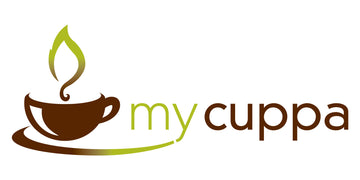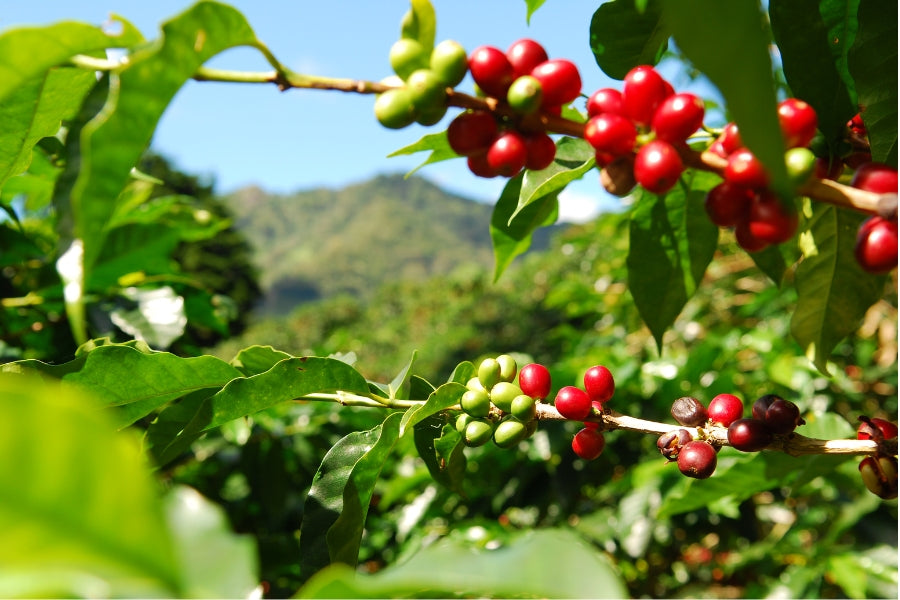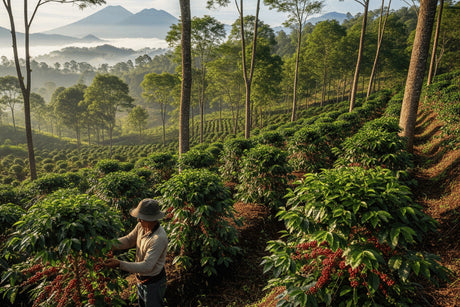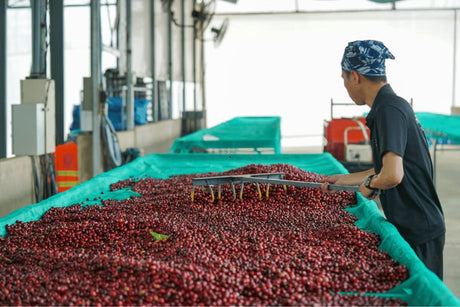mycuppa November 2014 Newsletter
We look at our three top picks to help customers find their delicious coffee.
Panama
During October, we started looking for our next Panama coffee as the remarkable Casa Ruiz nears the end of our holdings.
We have enjoyed the Casa Ruiz over the last two years - having sourced that coffee across three crop harvests.
Panama is a producer of truly magnificent coffees.
Silky smooth, creamy, sweet, rich and rewarding.
We have found a noble replacement in the Mama Cata - a coffee that has also been picked up by a few Specialty coffee roasters in Melbourne.
It's a very sweet cup with toasty nuts, caramel, cocoa, and cream flavours upfront.
Syrupy body and mellow yet tangy stone fruit acidity throughout with a roasted peanut and long dark chocolate finish.
Score - 84.5 points.
How we roast this amazing Panama coffee
As Panama's work well as a black brew, we are going to run this bean in 2 distinct roasting profiles - lighter to accentuate the stonefruit notes and offer via our filter category and then slightly darker (medium) to bring out the cocoa and caramel for espresso.
For those of you with excellent espresso extraction skills and high-end gear, I encourage you to look at the lighter-roasted version of this beautiful coffee.
Filter roasts of this coffee will only be performed fortnightly.
However, the traditional medium roast will be at least 2 or 3 times per week as per our general Panama schedule.
Panamas are fresh and available in our store here in Panama.
Kenya
Widely regarded as the origin producing the very top qualities.
Even an average-quality Kenyan will still punch well above its weight and beat the top qualities from other origins.
Supply of better quality Kenyans has been interrupted over the last 12 months due to the Coffee Board's control over exports.
Previously, it has been possible to undertake more direct sourcing, but this is being changed to introduce the Board as a broker.
You can still source directly. However, certain regions such as Nyeri have tighter Board controls now enforced.
Kenya has the most sophisticated auction system in the world. It is not a place for the faint-hearted.
Coffee lots are offered up for sale at the seller's premium, and if the market does not reach the price expectations, the seller withdraws their offer from the auction, packs up and leaves - knowing full well that the buyers will be back again to purchase coffee.
This mouse game between the buyers and sellers can play out over many weeks and even months if necessary.
A seller can sit on their produce until the price is met.
Suppliers dictating terms combined with quality beans, advanced farming and processing techniques all contribute to the higher prices we pay for Kenyans.
Are they worth it? Definitely!
Kenyan coffees stand-alone head and shoulders above all other origins.
The acidity can be 2x to 4x more intense than different arabica coffees.
Whilst high acidity sounds like it might be difficult to consume, it's the rich, clean way in which the acidity is delivered in Kenyans that makes it so enjoyable and, more importantly, "memorable".
For the last three years, we have run many excellent Kenyans - the Peaberry from Monarch was superb - rich, powerful, inky, winey, clean, and bright with an intense long blackberry and grapefruit finish.
For a short period, we also ran a rare and unique Kenya Natural (99% of Kenyans are fully washed) that was complex and sweet.
The Geturri was something sent from heaven.
One of our most expensive coffees, it was almost three times the price of a quality Central American.
In early November, we landed some exceptional coffees from Nyeri - fresh crop Gaikundo.
It's a toasty cup with a smooth, silky body that builds in the finish.
A nippy acidity accented with floral notes.
It has a very long and sweet finish with malt, caramel and a hint of fresh oranges.
Score - 86 points
How we roast this fabulous Kenyan coffee
I am still deciding whether we will run the Kenyan Gaikundo as a light filter roast.
Understandably, Kenyans are generally more suited to filter or slow brew methods than for espresso extraction.
Kenyans are hard, dense beans that need a lot of heat when roasting, particularly in the early stages.
As the acid in Kenyans can be wild and difficult to tame, a medium roast with a longer development time will yield a more subtle acid balance.
If you want a powerful, rewarding coffee experience - click on the link here: Kenya.
Burundi
Whilst all good things must come to an end, alas, the Mirango Microlot #1 has reached the end of the pallet.
What a sensational coffee we have enjoyed over the last two years - a complete surprise package and under-rated.
Over the last few weeks, we have rotated a Burundi natural through the schedule to help stretch out the Mirango #1 finish date.
However, 2nd November marks the official end of the Mirango, which has built up a substantial, loyal following amongst mycuppa customers.
What is it exactly that made the Burundi special?
The flavour was high and acidity well-balanced.
There was a unique fruit to the cup that was not offensive or overly dominant - pleasing and refreshing.
Burundi was the coffee that left you wanting another cup immediately after finishing.
It also worked extremely well with black or with milk.
The good news is we have two excellent replacements from micro-lots sourced out of the Muyinga estate.
Dark chocolate, malt and peach flavours upfront.
Rich, creamy body through to a sweet caramel finish with a lingering stone fruit note.
Score 84 points
For a truly special coffee, try out new micro lot here in Burundi.









